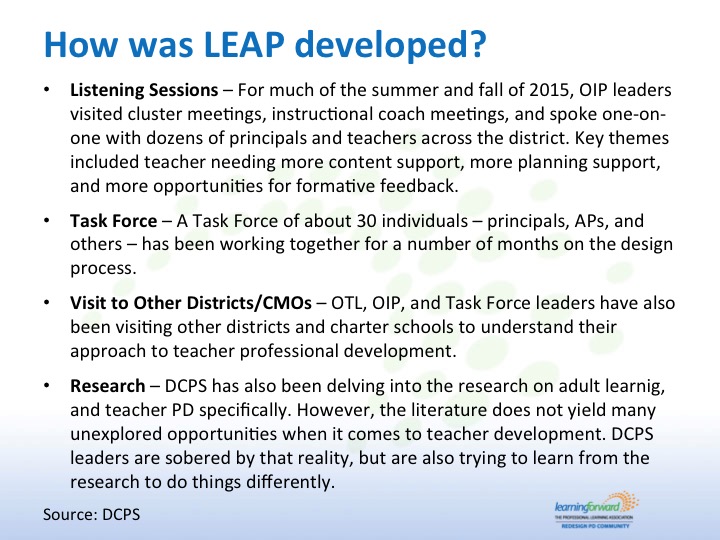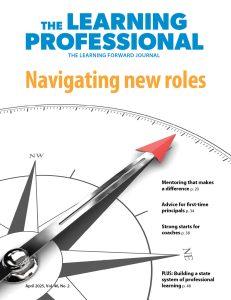Washington DC Public Schools (DCPS) has received a lot of national attention for its human capital policies, and the results have been impressive. In recent years the district implemented its innovative IMPACT teacher evaluation system, introduced performance-based compensation, added significantly to teacher curricular supports, invested heavily in teacher recruitment including shifting to more competitive timelines, expanded teacher leadership with teachers serving as leaders and coaches of their peers, and witnessed significant increases in teacher effectiveness. Indeed, DCPS was heralded as the country’s fastest-improving urban district in 2013 and again in 2015 based on NAEP results. As Amanda Ripley wrote in the February 2016 issue of the Washingtonian Magazine, “…Teaching in the nation’s capital finally looks like an aspirational profession.” How then is DCPS continuing to push this progress forward?
Enter the LEAP program, which stands for LEarning together to Advance our Practice. Led by the Office of Instructional Practice (OIP), the new program promises to continue the progress of the teacher growth at DCPS through an improved professional learning system. The program fundamentally shifts professional learning toward a clear objective of coherence and relevance. On the school-based LEAP teams, core content teachers, alongside SPED and ESL teachers, will engage in a weekly cycle of content pedagogy development, planning, and examination of student work and data, all led by a content-specific leader (a teacher leader, coach, or assistant principal). Principals will be responsible for setting the instructional vision and goals, managing the Academic Leadership Team (ALT), and maintaining a high bar for instruction across the building. The principal remains the unequivocal instructional leader in the school, and the ALT becomes even more important with LEAP, as it’s the body that will help ensure the LEAP Content Teams work effectively and in a coordinated way across the school.
“We want to help take the guesswork out of professional development for both teachers and leaders.” says Scott Thompson, a key architect of the LEAP program. “We don’t ask our teachers to design curriculum from scratch, and we shouldn’t ask our leaders to do that either.” Three big ideas that support this aspiration underpin the new approach:
1. Content is Key: As DCPS has raised curricular expectations over the past few years, deep knowledge of content has become more important than ever. At its core, LEAP is about building that knowledge and helping teachers apply it in their classrooms.
2. School Communities Are the Lever for Change: If DCPS is going to make big changes in how teachers experience professional learning, the focus will be on school-based activity to increase school-based capacity. School-based LEAP teams focused on discrete content areas will be the primary vehicle for professional learning.
3. It’s Time for an Adult Learning Curriculum: Building-level teams shouldn’t have to figure out how to support teachers on their own, especially in a world in which content expectations are increasingly rigorous. That’s why the Office of Instructional Practice is developing a content-specific PD curriculum that school leaders and coaches can use with the teachers on their teams.
Under LEAP, a teacher’s cycle of learning is significantly different than before. Paige Hoffman, DCPS’ Manager of Innovation and Design, notes, “With LEAP, teachers are getting follow-up feedback immediately after (the PD experience) through an observation within the next week. One of the biggest gripes we’ve heard concerns the lack of follow-up: the PD can be wonderful, but if there’s no follow up on implementation, we’re not going to see change in the practice. With LEAP, we are guaranteeing that the PD is high quality and differentiated and always includes work time to promote application, but also that the teachers are getting follow-up on the implementation of what they are learning.”
LEAP is bringing a lot of change, and quickly. As Thompson puts it, “a fast and furious” few months has resulted in completed LEAP plans for all schools, in time to dovetail with the district’s budget process. Given DCPS’s decentralized budget system, this is designed to be a budget-neutral change at the school level. Key successes in the rollout include clear design guides, sessions with groups of principals led in collaboration with their cluster superintendents, and facilitated work time for school-based teams to tackle difficult questions. “High-touch support for schools was really critical,” says Thompson. Individualized support and coaching will continue throughout the school year.
A key aspect of the program is ensuring that school-based leaders have opportunities for dramatically more robust development and support, given their critical role in leading LEAP teams. These leaders include assistant principals, instructional coaches, and teacher leaders. These leaders — about 500 across the district — will participate in a two-week training session in July. DCPS is developing and facilitating the session in collaboration with Leading Educators, and will support the participants extensive support over the course of the year.

The LEAP system will bring a few modifications to the IMPACT evaluation system, as well. These include changes to the rubric, bringing an end to the Master Educator Program, and adding student surveys to the multiple measures used. The IMPACT teacher evaluation system – first implemented by former Chancellor Michelle Rhee and continued under current Chancellor Kaya Henderson – considers gains in student test scores, along with observations by principals and master teachers from outside the school, in grading teachers. Although considered controversial by some, the system has positively affected teacher quality. A new study from the National Bureau of Economic Research authored by the University of Virginia’s Melinda Adnot, Veronica Katz, and James Wyckoff and Stanford’s Thomas Dee, finds that the IMPACT system improved student performance significantly.
As Matt Barnum points out on The Seventy Four, districts can learn several lessons from how DCPS has implemented the IMPACT system, and one of them is the district’s willingness to improve the system. He writes, “Perhaps one of the reasons D.C. was able to maintain political support for tough evaluation, is that the district showed a willingness to tweak the evaluation system in response to stakeholder feedback.” And, while IMPACT in the past has, as Barnum writes, “placed significant emphasis on giving teachers meaningful feedback to help them improve,” Thompson stresses that the turn to the LEAP program demonstrates the district’s drive to create widespread strategies to do much more on that front.
Educators from Washington DC Public Schools are participants in Learning Forward’s Redesign PD Community of Practice.








